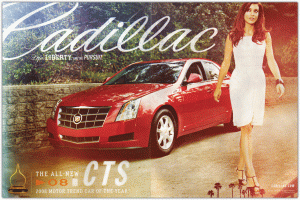We live in a time and place where people still strive for the American dream and living a happy life. Our society is continuously pushing for more happiness, and we seek it in different forms – more clothes, bigger houses, more experiences, more money. We think these things will improve our lives…and they very well may.
There’s only one problem – we, as a society, love immediate gratification more than anything. Everything you see is promoting some sort of temporary benefit. Take for instance this ad:
We see these ads all the time. Buy this car, guys, because you will get the girl of your dreams. As obvious as this is, and as much as we believe we can see through it, we are still prone to these persuasive ads. Many times we believe buying something will add to this internal view of yourself – I own a Cadillac so I am of higher class and will attract higher class potential partners.
Now, I just used this example because it is so common. Happiness, as we perceive it, can be found in many different forms.
I’m not a big advocate of pursuing happiness as an end. I don’t see pursuing happiness as a useful way to live a well-balanced, quality life…unless you define it properly. But even this may not be the most effective approach. This way of thinking leads you to always wanting more because we continue to only see temporary results. Remember, happiness is an emotion and it comes and goes. Unless you have created a strong personal system of emotional intelligence, you will find yourself in the happy-sad cycle too often for your own liking.
I recently watched a TED talk from Daniel Kahneman relating to this topic. He won a Nobel Prize and is known as the founder of behavioral economics. In this talk, Kahneman broke down happiness as being perceived by our 2 Selves. He also said that we pretty much have no idea how to understand our own happiness based on cognitive traps.
Kahneman breaks down the 2 selves as follows:
Experiencing Selves – your moment-to-moment happiness as you experience it.
Remembering Selves – how you think about your happiness based on your memories.
This was eye-opening for me to say the least. I really like the micro and macro way of how we view our experiences.
The key aspect to this is that the Experiencing Self and Remembering Self often have very different ways of perceiving happiness.
This conflict is one of the reasons why the continuous pursuit of happiness is not an effective approach.
Let’s use the example by Kahneman:
A man went to a symphony with wonderful music that he really enjoyed. However, at the very end there was a dreadful screeching sound. The man claimed it ruined the whole experience. But it hadn’t. The screeching sound only ruined the memory of the experience, not the experience in itself.
This is a great lesson and shows how the 2 Selves may differ in perceptions.
What can we take away from this?
First off, let’s acknowledge we are not good at determining what makes us happy.
Many of our everyday decisions are to make us happier in some way. When we buy that nice shirt, we are often doing so because it improves the view we have of our self and hopefully how others view us.
So should we focus on pleasing the Experiencing Self or the Remembering Self when making decisions?
I would say both. It is all about a certain balance. The purpose would be to make decisions to make you happier on a random Tuesday at 8:00 – moment-to-moment happiness. I think this is a reason a lot of people have pets. You also want to make decisions that will make you happiest looking back. The example Kahneman used was comparing and equally satisfying 1 week vacation and 2 week vacation. The second week doesn’t provide much additional value in the big picture, so it does not add much to the Remembering Self. The Experiencing Self may have had additional benefits though. Considering these factors going into a decision can be helpful – if you’re after more day-to-day happiness and positive memories.
This is all food for thought. We now know these 2 Selves may not always agree. Hopefully we can make an effort to create a quality balance between our two views of happiness.

Greg, great piece!
Matthew Kelley helped me understand my view of happiness. In my opinion there’s happiness and pleasure. People get them confused as you pointed out. The biggest difference being pleasure is temporary. Once the event causing the pleasure is done the feeling goes away. Also as you pointed out, people want immediate gratification that’s why society strives for bigger and better cars, houses, goods that when new give us those warm and fuzzy feelings. Downfall is once a bigger house, car, or good is on your radar the one you have is no longer up to par. I think the true way to become happy is by continual improvement. Improving yourself, relationships, faith, and well being. Happiness is almost the opposite of pleasure. For example working out. At the time you’re probably not getting tremendous joy from the activity but when you ‘re finished you feel amazing about what you accomplished.
Keep up the writing!
E
That’s a great way to look at it. Happiness is such a subjective term. Sometimes we need to step back and figure out what that means for us individually. Many people are stuck in that trap of seeking pleasure instead of finding what will ultimately improve their well-being and make them truly happy.